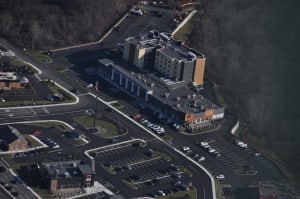Maybe this is the secret to develop a retail property in 2018.
An unlikely success story is unfolding in Marlborough at the 500,000-square-foot Apex Center of New England. Steering past the wreckage of anchor and specialty store closings, a local developer hit on a formula that plays into one of the retail industry’s rare growth opportunities: a four-story complex filled with “experiential” spaces where customers pay to compete, not to consume. The 4-story complex includes a virtual reality arcade, escape room, laser tag arena, go-kart course and golf simulator, along with 30-lane bowling alley and bar and grill.
Westford-based developer RAVentures built out the rest of the 13-building complex with two hotels and smaller retail pads occupied by quick-service chains and salons, but not a single purveyor of apparel or hard goods. After opening in January, The Apex Center has just four spaces still available, the largest approximately 4,000 square feet.
“As I talked to a lot of people about this project, the response was, ‘My God: why didn’t we think of that?’” said Dusty Burke, CEO of Bellingham-based American Commercial Real Estate, the Apex Center’s retail broker.
During the recent school vacation week, the center attracted approximately 100,000 patrons, General Manager Marcus Kemblowski estimates. The RAVentures-owned and -operated portion of the 4-story entertainment building – including bowling alley, ropes course, video arcade and restaurant – did approximately $500,000 in sales and was nearly filled to its 1,515-person capacity on most days, he said.
The Apex Center’s success shines against a gloomy backdrop in which retailers are on a pace to vacate over 90 million square feet nationwide in 2018. The rate of retrenchment threatens to exceed the 105 million square feet of negative absorption that occurred last year, according to CoStar research. Developers are expected to deliver approximately 80 million square feet of retail space across the U.S. in 2018, CoStar estimates, a 30 percent decline from the previous two years.
City Encouraged More Expansive Development
The Apex Center spun out of what were originally modest development plans. Developer Robert Walker, who owns the 110 Grill casual dining chain, was looking for a restaurant site in Marlborough. City officials were seeking to attract more hotels and restaurants for business travelers as an economic development strategy, and approved a new mixed-use zoning overlay district. That prompted Walker to acquire additional parcels bringing the site up to 43 acres and expand the complex to include hotels, additional retail pads and a 44,640-square-foot office and medical building being marketed by JLL Boston.
Concepts such as VR arcades and escape rooms can’t be cannibalized by Amazon Prime. But many have gravitated toward struggling enclosed shopping malls or underutilized industrial properties in poor retail locations, Burke noted. Putting dozens of such attractions on the same property was a first in New England, and the response among potential tenants exceeded availabilities.
RAVentures’ past partnerships with a Kansas hotel developer carried over into the Apex Center’s hospitality component: a 137-room Hyatt Place and 108-room Fairfield Inn & Suites, both of which opened in November. It was the seventh joint venture between RAVentures and True North Hotel Group.
While Marlborough officials welcomed the new lodging for business travelers, the properties also serve an important role attracting youth hockey families drawn to Marlborough for tournaments at the New England Sports Center. Burke estimated the Apex Center captures a vast trade area along Route 495 from Lowell to Wrentham and points as far west as Worcester and east to Wellesley.
“It’s convenience on steroids,” he said. “How do you make things attractive for very busy households?”




 |
| 




